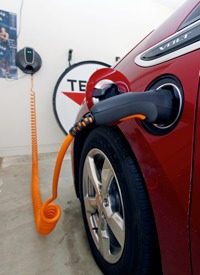
James Hohman, the center’s assistant director of fiscal policy, counted a total of 18 government “deals” but didn’t include the fact that one-quarter of Volt’s manufacturer, General Motors, is owned by the federal government.
He counted not only incentives offered directly to GM or to the ultimate buyer, but also those offered to suppliers of parts and technology for the Volt. The Department of Energy, for example, awarded a $106 million grant to GM’s Brownstone plant that assembles the Volt’s batteries. The State of Michigan awarded $106 million to GM to retain jobs in its Hamtramck assembly plant. And Compact Power, the company that makes the Volt’s batteries, received $100 million in “refundable battery credits.”
Some of the subsidies and credits are extended over varying periods of time and some are dependent upon certain production “milestones” being achieved. He counted them all along with subsidies to companies vying to provide batteries for the Volt such as the support provided to A123 Systems. A123 lost the battery contract to Compact Power, but Hohman included their subsidies in his study as well.
The total of all subsidies, grants and credits is $3 billion: $2.3 billion in federal money and $700 million in Michigan’s money. That’s enough to purchase 75,000 Volts at the current sticker price of $39,000.
A GM spokesman, Gary Martin, responded to Hohman’s study by declaring that there is nothing wrong with government subsidies as everyone else is doing it. In fact, these subsidies for the Volt are “much less than the hundreds of billions of dollars that Japanese and Korean auto and battery manufacturers have received over the years [and these ‘investments’] provided … match the foresight and innovation that other countries are exhibiting.”
Unfortunately, GM has only been able to sell 6,000 of them since they were introduced last December, despite rave reviews from Edmunds and Consumer Guide. According to USNews’ Ranking and Reviews, “The 2012 Chevrolet Volt ranks 1st out of 21 Upscale Midsize Cars…. Reviewers agree that the 2012 Chevrolet Volt is one of the best hybrid cars on the market, thanks to its impressive fuel economy.”
In spite of promises made in September that GM wouldn't have "any problem reaching our goal [of 10,000 units for the year]" by GM spokesman Rob Peterson, total sales as of December 19 were 5,816, more than 4,000 units short. And this despite purchases by General Electric and other fleet sales to cronies of the Obama administration.
As noted by Michigan State Representative Tom McMillan:
It just goes to show there are certain folks [in Washington and Lansing] who will spend anything to get their vision of what people should do. It’s a glaring example of the failure of central planning trying to force citizens to purchase something they may not want…. They should let the free market make those decisions.



